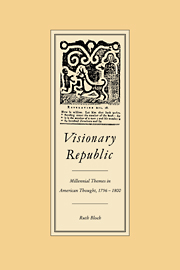Book contents
- Frontmatter
- Contents
- Acknowledgments
- Introduction
- PART I THE DEVELOPMENT OF A MILLENNIAL TRADITION IN COLONIAL AMERICA
- PART II THE RISE AND DECLINE OF MILLENNIALISM IN THE REVOLUTIONARY ERA
- PART III THE ESCHATOLOGICAL REVIVAL OF THE 1790'S
- 6 Exegesis
- 7 Francophilic millennialism and partisan Republican ideology
- 8 Biblical millennialism and radical Enlightened utopianism
- 9 Francophobic reaction and evangelical activism
- Notes
- Index
8 - Biblical millennialism and radical Enlightened utopianism
Published online by Cambridge University Press: 29 October 2009
- Frontmatter
- Contents
- Acknowledgments
- Introduction
- PART I THE DEVELOPMENT OF A MILLENNIAL TRADITION IN COLONIAL AMERICA
- PART II THE RISE AND DECLINE OF MILLENNIALISM IN THE REVOLUTIONARY ERA
- PART III THE ESCHATOLOGICAL REVIVAL OF THE 1790'S
- 6 Exegesis
- 7 Francophilic millennialism and partisan Republican ideology
- 8 Biblical millennialism and radical Enlightened utopianism
- 9 Francophobic reaction and evangelical activism
- Notes
- Index
Summary
… many shall run to and fro, and knowledge shall be increased.
Daniel 12:4Alongside the resurgence of biblical millennialism in the 1790's arose a secular Utopian vision. It too saw the French Revolution as promising an imminent and radical transformation of the world and looked forward to the universal establishment of peace, freedom, morality, and truth on the ruins of political tyranny and religious superstition. In contrast to biblical millennialism, however, secular Utopian prophecy was not based on the authority of Scripture, nor did it assume the active role of a providential God. Its key terms were not those of revealed Christianity but more exclusively those of the radical republican Enlightenment: liberty, reason, and the rights of man.
The relationship between biblical millennialism and this radical Enlightened utopianism of the 1790's was at first not antagonistic but complementary. Gradually after the middle of the decade the boundaries between them became increasingly distinct as many leading orthodox Protestants gravitated towards Federalism and strongly disassociated themselves from the Deism of the French revolutionary government. During the initial phases of the French Revolution, however, when much of the clergy still regarded French republicans as the agents of God, biblical millennialism continued to be interwoven with varieties of radical Enlightenment thought. The sense of the incompatibility of revelation and reason, like the opposition of churches to political revolution, developed much more slowly and incompletely in America than in England or on the Continent, where the established clergy had long been firmly identified with the ancien régime.
- Type
- Chapter
- Information
- Visionary RepublicMillennial Themes in American Thought, 1756–1800, pp. 187 - 201Publisher: Cambridge University PressPrint publication year: 1985



